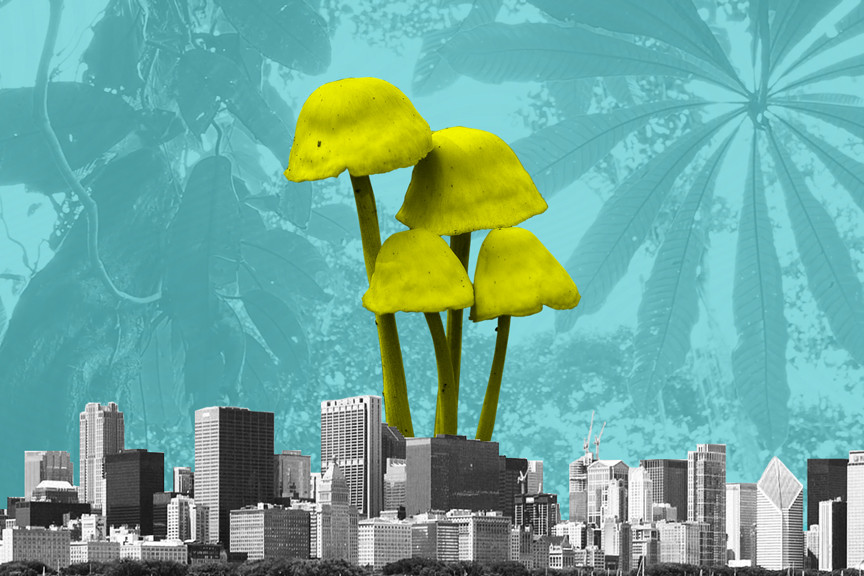Chicago could become largest city to Decriminalize Entheogenic Plants
Chicago’s Committee on Health and Human Relations unanimously passed (50-0) a resolution October 16 to decriminalize entheogenic plants and fungi.

Psymposia is a 501(c)(3) nonprofit research and media organization that offers critical perspectives on drugs, politics, and culture. We rely on contributions from our readers and listeners. Your support is vital to sustaining Psymposia.
Support Psymposia’s independent journalism on Patreon and help us drive the Mystery Machine! We’re a bunch of meddling kids who are unmasking the latest shenanigans on the psychedelics beat.
Chicago’s Committee on Health and Human Relations unanimously passed (50-0) a resolution October 16 to decriminalize entheogenic plants and fungi.
This is an exciting first step towards decriminalization in Chicago, according to former Chicago Blackhawks player Daniel Carcillo, who helped bring the resolution to the city along with the group Decriminalize Nature. But, entheogens are “not decriminalized in Chicago yet,” Carcillo wrote on Instagram. “[The resolution] was referred through consent calendar and still needs to go through community comments and to final vote and pass city council in order to be finalized. Lots of work yet to do.”
If this process is successful, Chicago will become the largest city in the United States to decriminalize entheogens.
The intent of the resolution is to support entheogenic plant practices, de-prioritize the criminalization of these substances and their users, and develop guidelines and resources for “non-pharmacological treatment options in Chicago.”
The resolution begins with a long list of justifications for the use of entheogenic plants. Among this list are references to the use of entheogens in the treatment of addiction, end of life anxiety, PTSD, chronic depression, and cluster headaches, as well as the fact that some entheogenic practices among religious groups are already protected by the US government.

The document resolves that “no department, agency, board, commission, officer, employee, or any other individual representing the City…[and] the Chicago Police Department and its personnel, shall use ANY funds or resources to assist in the enforcement of laws imposing any penalties for the use and possession of Entheogenic Plants for Adult Use.”
It states that investigation and arrest of adults planting, cultivating, purchasing, transporting, distributing, and using Schedule 1 entheogenic plants will be amongst the lowest level of the Chicago Police Department’s priorities. And, it calls upon the Cook County Circuit Court system to cease prosecution of anyone involved in the use of entheogenic plants and plant-based compounds.
The Psychedelic Science Review (PSR) points out in their reporting that the resolution will likely be a major milestone for scientists, reformers, and psychedelic plant advocates.
“Chicago is home to several major universities including University of Chicago and Northwestern University, potentially reducing barriers to scientific research on these understudied organisms,” PSR reports. “As the largest city in the United States’ Midwest region, the City of Chicago is also central to political, social and economic activity in the region.”
Decriminalization of entheogenic plants in Chicago appears on the heels of the passage of similar resolutions in Oakland, California and Denver, Colorado. Efforts to decriminalize these substances can be found popping up throughout the rest of the country, too, in places like Oregon, Missouri, and Washington.
Although these resolutions do not change the legal status of possession and use of entheogenic plants under federal law, they redirect the attention of local law enforcement away from these substances.
The full Chicago Committee on Health and Human Relations resolution can be found here.
Hey! Before you go… Psymposia is a 501(c)(3) non-profit media organization that offers critical perspectives on drugs, politics, and culture. We strive to ask challenging questions, and we’re committed to independent reporting, critical analysis, and holding those who wield power accountable.
Our perspectives are informed by critical analysis of the systemic crises of capitalism that have directly contributed to the unmitigated growth of addiction, depression, suicide, and the unraveling of our social relations. The same economic elite and powerful corporate interests who have profited from causing these problems are now proposing “solutions”—solutions which both line their pockets and mask the necessity of structural change.
In order for us to keep unpacking these issues and informing our audience, we need your continuing support. You can sustain Psymposia by becoming a supporter for as little as $2 a month.
Russell Hausfeld
Russell Hausfeld is an investigative journalist and illustrator living in Cincinnati, Ohio. He has a Bachelor’s degree in Journalism and Religious Studies from the University of Cincinnati. His work with Psymposia has been cited in Vice, The Nation, Frontiers in Psychology, New York Magazine’s “Cover Story: Power Trip” podcast, the Daily Beast, the Outlaw Report, Harm Reduction Journal, and more.





